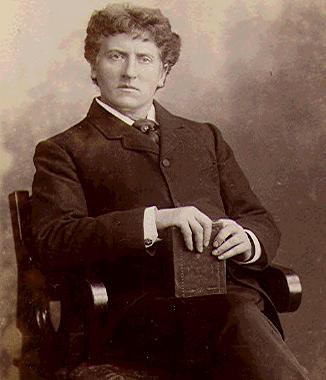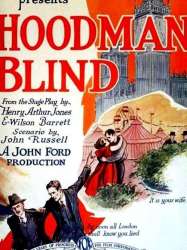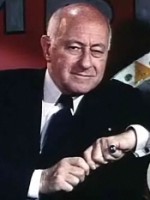Wilson Barrett is a Scriptwriter British born on 18 february 1846 at Essex (United-kingdom)

Wilson Barrett (born William Henry Barrett; 18 February 1846 – 22 September 1904) was an English manager, actor, and playwright. With his company, Barrett is credited with attracting the largest crowds of English theatregoers ever because of his success with melodrama, an instance being his production of The Silver King (1882) at the Princess's Theatre of London. The historical tragedy The Sign of the Cross (1895) was Barrett's most successful play, both in England and in the United States.
Barrett was born into a farming family in Essex. He is remembered as an actor of handsome appearance (despite his small stature) and with a powerful voice. He made his first appearance on the stage at Halifax in 1864, and then played in the provinces alone and with his wife, Caroline Heath, in East Lynne. They married in 1866, having two sons, Frank and Alfred, and three daughters, Ellen, Katherine and Dorothea (Dollie).
Barrett capitalized on his early success as an actor to start a career as a producer. After managerial experience at the Grand Theatre Leeds and elsewhere, in 1879 he took over the management of the Old Court theatre, where in the following year he introduced Madame Helena Modjeska to London in an adaptation of Maria Stuart (by Schiller), together with productions of Adrienne Lecouvreur, La Dame aux camélias and other plays.
In 1881, Wilson Barrett took over the recently refurbished Princess's Theatre, where his melodramatic productions enjoyed great success (if not quite as much as before), with attendance being the highest ever for this theatre. There Barrett presented The Lights o' London, and then The Silver King, regarded as the most successful melodrama of the 19th century in England. It debuted on 16 November 1882, with Barrett as Wilfred Denver. He played this part for three hundred nights without a break, and repeated its success in W. G. Wills's Claudian.
In 1885 he and Henry Arthur Jones produced Hoodman Blind and in 1886 co-operated with Clement Scott in Sister Mary. In 1886 Barrett left the Princess's Theatre, and in this same year he made a visit to America, repeated in later years.
In 1884 Barrett had appeared in Hamlet, only to promptly return to melodrama. He was not to find much success in any Shakespearian role, except in the role of Mercutio in Romeo and Juliet.
Though Barrett had occasional seasons in London he acted chiefly in the provinces, with his company being one of the most successful of the decade, receiving a £2,000 average yearly profit just from the Grand Theatre Leeds. His brother and his nephew were part of the company, and his grandson would join them eventually.
His productions were not immune to accident. His melodrama Romany Rye was scheduled to open at the Theatre Royal, Exeter on 5 September 1887. In the middle of the performance, gas lighting ignited some gauze, fire broke out backstage, and then the curtain collapsed.
According to Jacob Adler, Wilson Barrett was the most famous actor on the London stage of the 1880s.
1890s: The Sign of the Cross
By the 1890s, the London stage was already coming under new influences, and Wilson Barrett's vogue in melodrama had waned, leaving him in financial difficulties. From 1894 he toured the United States, including the American and Knickerbocker theatres of Broadway.
Still there in 1895, Barrett found fortune again with a production which would effectively become his most successful, the historical tragedy The Sign of the Cross -- which was originally produced in the United States at the Grand Opera House, St. Louis, Missouri on 28 March 1895; in the United Kingdom, at the Grand Theatre, Leeds, on 26 August 1895; in London, at the Lyric Theatre, London on 4 January 1896; and in Australia, at Her Majesty's Theatre, Sydney on 8 May 1897 -- in which Barrett played Marcus Superbus, an old Roman patrician of the years of Nero, who falls in love with a young woman, Mercia (originally played by Maud Jeffries) and converts to Christianity for her, both sacrificing their lives in the arena to the lions. The plot in some ways strongly resembles the contemporary novel Quo Vadis, and it may have been an unofficial adaptation of it, though Barrett never acknowledged this.
Then Barrett brought the play to England, starting at Leeds also in 1895, before going to the Lyric Theatre of London with equal success.
The theatre was crowded with audiences largely composed of people outside the ordinary circle of playgoers, shepherded by enthusiastic local clergymen. Barrett tried to repeat this success with more plays of a religious type, though not with equal effect, and several of his later attempts were failures.
In 1898 Barrett visited Australia and at the turn of the century he co-founded the company which became Waddingtons, originally as a theatre-focused printing firm.
Death
Wilson Barrett died at Liverpool, on 22 July, 1904. Thanks largely to the success of the Sign of the Cross, he left £57,000, even after periods of relative failure, mainly during his later years managing the Old Court Theatre. His grandson, also named Wilson Barrett, became an actor director with the Brandon-Thomas Company before starting his own repertory in 1939, the Wilson Barrett Company, which based itself in Edinburgh's Lyceum, Glasgow at the Alhambra Theatre Glasgow and for a time in Aberdeen. It also performed on television, at the Edinburgh International Festival and, by invitation, in South Africa.The company was retired in 1954.
Source : Wikidata
Wilson Barrett

- Infos
- Photos
- Best films
- Family
- Characters
- Awards
Birth name William Henry Barrett
Nationality United-kingdom
Birth 18 february 1846 at Essex (United-kingdom)
Death 22 september 1904 (at 58 years) at London (United-kingdom)
Nationality United-kingdom
Birth 18 february 1846 at Essex (United-kingdom)
Death 22 september 1904 (at 58 years) at London (United-kingdom)
Biography
1880sBarrett was born into a farming family in Essex. He is remembered as an actor of handsome appearance (despite his small stature) and with a powerful voice. He made his first appearance on the stage at Halifax in 1864, and then played in the provinces alone and with his wife, Caroline Heath, in East Lynne. They married in 1866, having two sons, Frank and Alfred, and three daughters, Ellen, Katherine and Dorothea (Dollie).
Barrett capitalized on his early success as an actor to start a career as a producer. After managerial experience at the Grand Theatre Leeds and elsewhere, in 1879 he took over the management of the Old Court theatre, where in the following year he introduced Madame Helena Modjeska to London in an adaptation of Maria Stuart (by Schiller), together with productions of Adrienne Lecouvreur, La Dame aux camélias and other plays.
In 1881, Wilson Barrett took over the recently refurbished Princess's Theatre, where his melodramatic productions enjoyed great success (if not quite as much as before), with attendance being the highest ever for this theatre. There Barrett presented The Lights o' London, and then The Silver King, regarded as the most successful melodrama of the 19th century in England. It debuted on 16 November 1882, with Barrett as Wilfred Denver. He played this part for three hundred nights without a break, and repeated its success in W. G. Wills's Claudian.
In 1885 he and Henry Arthur Jones produced Hoodman Blind and in 1886 co-operated with Clement Scott in Sister Mary. In 1886 Barrett left the Princess's Theatre, and in this same year he made a visit to America, repeated in later years.
In 1884 Barrett had appeared in Hamlet, only to promptly return to melodrama. He was not to find much success in any Shakespearian role, except in the role of Mercutio in Romeo and Juliet.
Though Barrett had occasional seasons in London he acted chiefly in the provinces, with his company being one of the most successful of the decade, receiving a £2,000 average yearly profit just from the Grand Theatre Leeds. His brother and his nephew were part of the company, and his grandson would join them eventually.
His productions were not immune to accident. His melodrama Romany Rye was scheduled to open at the Theatre Royal, Exeter on 5 September 1887. In the middle of the performance, gas lighting ignited some gauze, fire broke out backstage, and then the curtain collapsed.
According to Jacob Adler, Wilson Barrett was the most famous actor on the London stage of the 1880s.
1890s: The Sign of the Cross
By the 1890s, the London stage was already coming under new influences, and Wilson Barrett's vogue in melodrama had waned, leaving him in financial difficulties. From 1894 he toured the United States, including the American and Knickerbocker theatres of Broadway.
Still there in 1895, Barrett found fortune again with a production which would effectively become his most successful, the historical tragedy The Sign of the Cross -- which was originally produced in the United States at the Grand Opera House, St. Louis, Missouri on 28 March 1895; in the United Kingdom, at the Grand Theatre, Leeds, on 26 August 1895; in London, at the Lyric Theatre, London on 4 January 1896; and in Australia, at Her Majesty's Theatre, Sydney on 8 May 1897 -- in which Barrett played Marcus Superbus, an old Roman patrician of the years of Nero, who falls in love with a young woman, Mercia (originally played by Maud Jeffries) and converts to Christianity for her, both sacrificing their lives in the arena to the lions. The plot in some ways strongly resembles the contemporary novel Quo Vadis, and it may have been an unofficial adaptation of it, though Barrett never acknowledged this.
Then Barrett brought the play to England, starting at Leeds also in 1895, before going to the Lyric Theatre of London with equal success.
The theatre was crowded with audiences largely composed of people outside the ordinary circle of playgoers, shepherded by enthusiastic local clergymen. Barrett tried to repeat this success with more plays of a religious type, though not with equal effect, and several of his later attempts were failures.
In 1898 Barrett visited Australia and at the turn of the century he co-founded the company which became Waddingtons, originally as a theatre-focused printing firm.
Death
Wilson Barrett died at Liverpool, on 22 July, 1904. Thanks largely to the success of the Sign of the Cross, he left £57,000, even after periods of relative failure, mainly during his later years managing the Old Court Theatre. His grandson, also named Wilson Barrett, became an actor director with the Brandon-Thomas Company before starting his own repertory in 1939, the Wilson Barrett Company, which based itself in Edinburgh's Lyceum, Glasgow at the Alhambra Theatre Glasgow and for a time in Aberdeen. It also performed on television, at the Edinburgh International Festival and, by invitation, in South Africa.The company was retired in 1954.
Best films
Usually with
Filmography of Wilson Barrett (4 films)
Scriptwriter

The Sign of the Cross (1932)
, 2h2Directed by Cecil B. DeMille
Origin USA
Genres Drama, Historical
Themes Films set in Africa, Films about religion, Films about sexuality, LGBT-related films, Films based on the Bible, Films based on plays, LGBT-related films, LGBT-related film, Lesbian-related films
Actors Fredric March, Elissa Landi, Claudette Colbert, Charles Laughton, Arthur Hohl, Ian Keith
Roles Theatre Play
Rating67%





Rome est en feu depuis trois jours. Du haut de son palais impérial, Néron contemple le brasier, fomenté par lui, tout en composant un poème. Mais aux cris d’effroi qui s’élèvent des rues embrasées, des clameurs de haine et de révolte surgissent, l’incendie est criminel et le peuple de Rome réclame les responsables. Tigellinus, capitaine des gardes de l’empereur, suggère à Néron d'attribuer aux chrétiens la responsabilité de l’incendie. Aussitôt le peuple exige vengeance et tous les chrétiens sont pourchassés par les soldats romains.

Hoodman Blind (1923)
, 1hDirected by John Ford
Origin USA
Genres Drama
Themes Théâtre, Films based on plays, Children's films
Actors David Butler, Gladys Hulette, Frank Campeau, Marc McDermott, Eddie Gribbon
Roles Writer
Rating43%






A Man of Sorrow (1916)
, 1hDirected by Oscar Apfel
Origin USA
Actors William Farnum, Dorothy Bernard, Willard Louis, Fred Huntley, Henry Arthur Barrows

The Sign of the Cross (1914)
Directed by Frederick A. Thomson
Origin USA
Themes Films set in Africa, Films based on plays
Actors William Farnum, Ethel Grey Terry, Morgan Thorpe
Roles Theatre Play
Rating58%





 Connection
Connection




